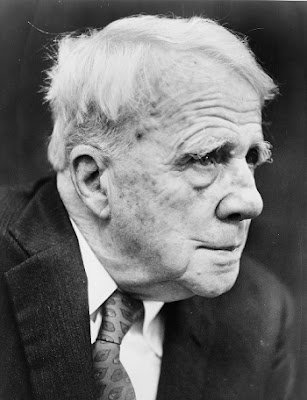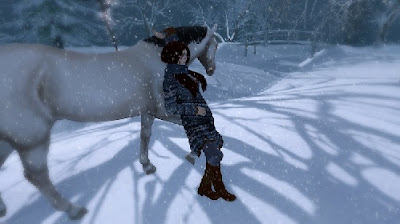Stopping by Woods on a Snowy Evening by Robert Frost
Robert Frost is one of the well-known American Poets. He was born on 26 March 1874 in San Francisco, California, U.S.A. The first two volumes of his poetry: A Bov's will(1913) and North of Boston(1914) were first published in England. Later, eight more volumes of his poetry were brought out in America: Mountain interval (1916), New Hmpshire (1923), West Running Brook (1928), A Further Range (1936), A Witness Tree (1942), Come in ad other Poems (1943), A Masque of Reason (1945) and A Masque of Mercy (1947).
Stopping by Woods on a Snowy Evening
Whose woods these are I think I know.
His House is in the village though
He will not see me stopping here
To watch his woods fill up with snow.
My little horse must think it queer
To stop without a faun house hear.
Between the woods and frozen lake
The darkest evening of the year.
He gives his harness bells a shake
To ask if there is some mistake
The only other sounds' the sweep
Of easy wind and downy flake.
The woods are lovely dark and deep
But I have promises to keep
And miles to go before I sleep
And miles to go before I sleep.
The poem Stopping by Woods on a Snowy Evening comprises four stanzas and the narrative is simple. This poem suggests an underlying idea that one must have a focus in life. We must be focused to achieve our goal and should not be tempted by the other attractions we find in the world.
In stanza I, the poet says that he knows the owner of the woods whose house is in the village and who may not the poet admiringly watching his woods fill up with snow.
In stanza I, the poet says that he knows the owner of the woods whose house is in the village and who may not the poet admiringly watching his woods fill up with snow.
In stanza II, the poet fancifully imagines that his horse might think it strange to stop between the woods and the frozen lake where there is no farmhouse.
In stanza III, the poet continues in the same vein as in stanza II and imagines that the horse shakes his harness bells now and then to ask whether there is any mistake in stopping near the woods. Further, the poet says that besides the sound of the bells, the only other sound is that of the wind.
In the concluding portion of the poem i.e. stanza IV, the poet declares that even though the woods are attractive, he can not go to the woods as he has a number of promises to keep and many miles to travel before taking rest.
The poem Stopping by Woods on a Snowy Evening is not just a record of something that once happened to the poet. It expresses the conflict between the demands of practical life with its obligations to others and the poignant desire to escape into a land of reverie.
The poet's consciousness seems to be on the verge of freeing itself from ordinary life, but the poet remembers that his journey has a purpose and he has promises to keep and miles to go before he can yield to the dreamlike release which the woods offer.
There is no overt symbolism in this poem. Yet the reader finds his vision directed in such a way that he sees the poet's purely personal experience as an image of experiences common to all. The wide scope of the meaning becomes obvious in the last four lines. These state the conflict in a simple, realistic way.
Further, the depth, richness, and significance of the lyric are brought out only on a symbolistic reading. Sleep, and darkness, suggesting death and the woods suggest enchantment. Frost's symbols define and explain each other. The woods which the poet enjoys looking upon are opposed to the promises he must keep. Since the poet will allow himself to sleep only after he has kept his promises. Sleep becomes a deserved reward in contrast to the unearned pleasure of looking at the woods.
Poetic Devices
Robert Frost's Stopping by woods on a snowy evening is a lyric. The term lyric is used for any fairly short, non-narrative poem presenting a single speaker who expresses a state of mind or a process of thought or feeling.
The first three stanzas follow the rhyme pattern a-a-b-a. In the last stanza, the end words in all the four lines rhyme with each other -deep-keep-sleep-sleep.
Darkness and sleep are symbol for death, the woods for enchantment or reverie.




ConversionConversion EmoticonEmoticon